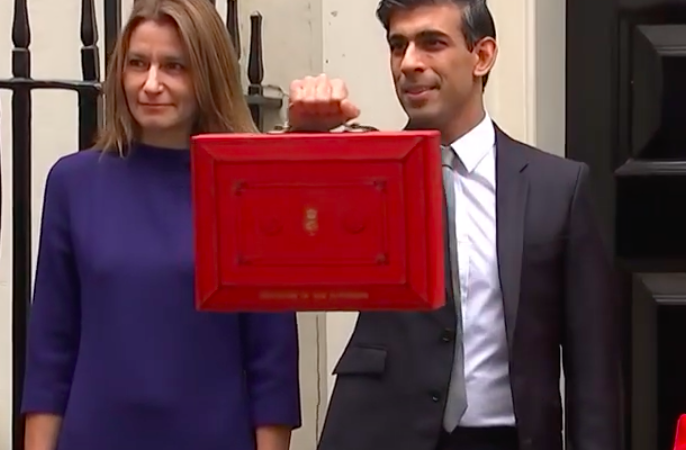'At a time of fragile economic recovery the government is squeezing household budgets, workers and pensioners. There is no sign of levelling-up.'

Prem Sikka is an Emeritus Professor of Accounting at the University of Essex and the University of Sheffield, a Labour member of the House of Lords, and Contributing Editor at Left Foot Forward.
The Chancellor’s budget statement won’t lead to economic renaissance, reduce inequalities or improve household budgets.
Household budgets are being squeezed by rising energy and food prices. The rate of inflation is expected to hit 5% soon and erode the purchasing power of wages and savings, but the Chancellor has not offered any relief by eliminating VAT on domestic fuel, imposing rent controls or challenging corporate profiteering.
The increase in the headline hourly minimum wage rate to £9.50 from 1 April 2022 would give 2.6 million workers temporary relief, but would be eroded by higher inflation, income tax and national insurance contributions. The freezing of income tax personal allowance and higher rate threshold until 2026 reduces annual household spending power by £13.9bn. From April 2022, the #JohnsonTax i.e. 1.25% increase in national insurance contributions will remove between £16.7bn and £18.2bn a year from household budgets. The government has rowed back a little on the Universal Credit cut of £6bn by changing the taper arrangements, which permit those at work to retain more of their pay. But some 4.4 million families will be worse off by £4bn a year.
The word ‘women’ gets just one mention in the Chancellor’s statement and is not accompanied by policies to eradicate the gender pay gap, tax disadvantages or provide additional childcare. The ‘disabled’ and ‘pensioners’ get no mention.
With the suspension of the triple-lock, the state pension is expected to rise 3.1% from April 2022. That increase will be wiped out by the rise in inflation. The current average state pension is around £8,000 a year, equivalent to 25% of average earnings and is the lowest in the industrialised world. The 3.1% promised increase is already wiped-out by the expected 5% rate of inflation. The government has refused to honour the triple-lock. It claimed not to be able to find £4.7bn to increase the state pension by 8.3%, in line with the growth in average earnings even though the National Insurance Fund account has a surplus of £37bn. But the Chancellor has found resources to give a £4bn tax cut to banks awash with cash, bumper profits and record dividends. Wealthy elites taking short flights, at a time of climate crisis, will benefit from £130m reduction in Air Passenger Duty.
The government’s squeeze would make the average worker almost £13,000 a year worse off by the middle of the 2020s. It could be avoided through redistribution. By taxing capital gains at the same rate as earned income, some £17bn a year could be raised plus another £8bn in national insurance because currently no national insurance is paid on unearned income. The same treatment of dividends would raise another £6bn. By extending the 12% rate of national insurance to incomes above £50,300, £14bn can be raised. A wealth tax can raise up to £304.1bn over a 5 year period. Such policies reduce inequalities and provide resources for public investment, but are ignored by the government.
What of the future? The Chancellor claimed that the economy is growing at record levels. Actually, this is due to statistical quirks caused by the Covid-lockdown. With the bounce of reopening, the economy may grow by 6.5% this year and 6% in 2022. The forecast is 2.1%, 1.3% and 1.6% growth over the next three years. The squeeze on household budgets could derail the assumed growth rates.
A major reason for the low economic growth is that a decade of low interest rates, inflation and corporate taxes has not produced greater investment in productive assets or research and development (R&D). UK businesses have never shown a huge appetite for risky innovation and the state had to shoulder the cost. So the government response is to reduce R&D spend by £2bn to £20bn. By 2024, it would spend around 1.1% of GDP on R&D; almost the lowest government spend in Europe. It won’t deliver high productivity and growth that the Chancellor claimed.
The government’s mishandling of Brexit is holding back the economy. The Office for Budget Responsibility (OBR) said that “supply bottlenecks have been exacerbated by changes in the migration and trading regimes following Brexit. Energy prices have soared, labour shortages have emerged in some occupations, and there have been blockages in some supply chains. These can be expected to hold back output growth”. Yet the Chancellor offered no policies for addressing the structural problems.
The much hyped policy of freeports did not get full endorsement from the OBR either. Freeports are economic zones where normal customs duty, VAT, tax, national insurance and business rates do not apply. The government is handing out sweeteners averaging £50 million a year to get businesses to locate there. The OBR said: “There is also broader uncertainty around how much of the economic activity that takes place within a freeport will have been displaced from other UK regions and how much is genuinely additional” i.e. freeports won’t generate economic renaissance.
The budget is a continuation of the government’s class wars. At a time of fragile economic recovery it is squeezing household budgets, workers and pensioners. There is no sign of levelling-up.
Left Foot Forward doesn't have the backing of big business or billionaires. We rely on the kind and generous support of ordinary people like you.
You can support hard-hitting journalism that holds the right to account, provides a forum for debate among progressives, and covers the stories the rest of the media ignore. Donate today.



